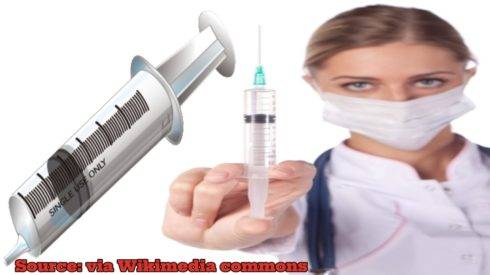The Minister of State for Health, Dr. Tunji Alausa, has proposed implementing a complete prohibition on the importation of medical syringes into Nigeria in a laudable step aimed at bolstering domestic production and driving economic growth, This initiative aligns with the government’s efforts to promote local manufacturing and reduce the nation’s reliance on imports, fostering self-sufficiency and strengthening the domestic industry.
Dr. Tunji Alausa’s remarks were delivered during his official visit to the state-of-the-art Afrimedical Manufacturing and Supplies Limited Syringe factory in Karameh Industrial City, Arepo, Ogun State. The minister highlighted the significant economic value of this facility and underscored the need to protect domestic industries through a backward integration model. This approach seeks to enhance local capacity, enabling Nigerian manufacturers to meet the country’s demand for medical syringes and contribute to the nation’s economic development.
Minister of State for Health, Dr. Tunji Alausa: NAFDAC to Stop Issuing Import Permits for Syringes
Aligning with the proposed ban of Dr. Tunji Alausa on imported medical syringes, the Director-General of the National Agency for Food and Drug Administration and Control (NAFDAC), Prof. Mojisola Adeyeye, has revealed that the agency has already ceased issuing import permits to importers, including international collaborators. This decisive step demonstrates the government’s commitment to supporting domestic syringe manufacturing and reducing reliance on foreign imports.
In her statement, Adeyeye clarified that “This suspension applies even to syringes previously imported by NAFDAC’s international partners. The goal is to shift the focus towards supporting domestic syringe manufacturing.” By restricting imports, NAFDAC aims to create a more favorable environment for local manufacturers to thrive and meet Nigeria’s demand for medical syringes. This strategic move not only promotes self-sufficiency but also encourages the growth and development of the domestic syringe manufacturing industry.
Dr. Tunji Alausa, Minister of State for Health: Hand-Holding” Approach to Support Local Manufacturers
In a proactive move to support and nurture the local syringe manufacturing industry, NAFDAC (National Agency for Food and Drug Administration and Control) has adopted a “hand-holding” approach. This collaborative strategy involves working closely with domestic syringe companies to address any shortcomings or challenges they may face in their operations. As Prof. Mojisola Adeyeye, the Director-General of NAFDAC, explained, “For the local manufacturers, we are doing hand-holding with our Syringe companies. Hand-holding, meaning we are working with them by correcting whatever we found wrong or inappropriate in their operations.”
This hands-on approach by NAFDAC aims to ensure that local syringe manufacturers meet the necessary quality standards and regulatory requirements. By identifying areas for improvement and providing guidance, NAFDAC seeks to facilitate the growth and competitiveness of these companies in the market. Through this collaborative effort, domestic manufacturers can address operational challenges, enhance their processes, and position themselves as reliable and efficient suppliers of medical syringes, not only catering to the local market but also potentially exploring export opportunities in the future.
Minister of State for Health Dr. Tunji Alausa: WHO’s Interest in Nigerian Syringe Manufacturers
The Nigerian government’s concerted efforts to promote local syringe manufacturing are already yielding tangible results, as evidenced by the World Health Organization’s (WHO) expressed interest in partnering with domestic companies in this sector. This development underscores the growing recognition of Nigeria’s burgeoning syringe industry and its potential to meet global standards and compete on the international stage.
According to Prof. Mojisola Adeyeye, the Director-General of NAFDAC, “This initiative has started yielding positive dividends as the World Health Organization (WHO) recently requested the names of the three syringe manufacturing companies in Nigeria to do business with.” This significant interest from a renowned global health organization highlights the progress made by Nigerian manufacturers in establishing themselves as reliable and capable players in the syringe production domain. It also showcases the potential for the domestic industry to not only meet local demands but also contribute to global healthcare supply chains, fostering economic growth and international recognition for Nigeria.
Minister of State for Health, Dr. Tunji Alausa: Economic Benefits of Domestic Syringe Production
The proposed ban on imported syringes by Dr. Tunji Alausa, Minister of State for Health and the support for local manufacturing are expected to have significant economic benefits for Nigeria. By reducing reliance on imports, the country can conserve valuable foreign exchange and redirect those resources towards other critical sectors.
Moreover, a thriving domestic syringe manufacturing industry can create employment opportunities, contribute to skill development, and foster technological advancements within the country. This aligns with the government’s broader goals of promoting economic diversification and sustainable development.
Dr. Tunji Alausa: Challenges and Opportunities Ahead
While the proposed ban on imported medical syringes by Dr. Tunji Alausa, Minister of State for Health, presents numerous opportunities for the domestic industry, it also brings forth challenges that must be addressed. Local manufacturers may initially face hurdles related to production capacity, quality control, and competitiveness as they navigate the transition towards self-sufficiency. Scaling up operations, adhering to stringent quality standards, and competing with well-established global players could prove daunting, especially in the initial stages.
However, the Nigerian government’s support through initiatives like NAFDAC’s “hand-holding” approach and potential collaborations with international organizations like the World Health Organization (WHO) offer a lifeline for domestic syringe manufacturers. By working closely with these companies, providing guidance, and facilitating knowledge transfer, the government and international partners can equip Nigerian manufacturers with the necessary tools to overcome obstacles. This collaborative effort presents a unique opportunity for local manufacturers to enhance their capabilities, meet global standards, and establish themselves as major players in the global syringe market, ultimately contributing to the nation’s economic growth and self-reliance.
Table of Contents
Discover more from OGM News NG
Subscribe to get the latest posts sent to your email.














